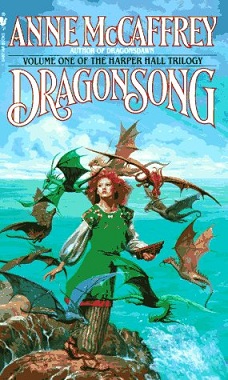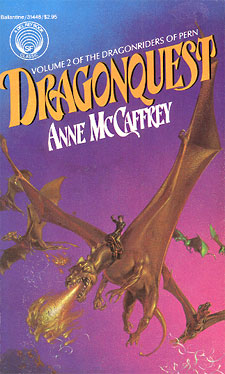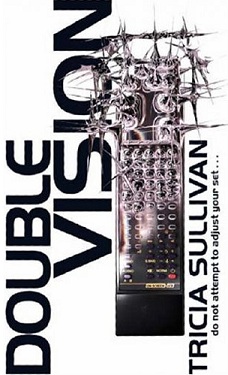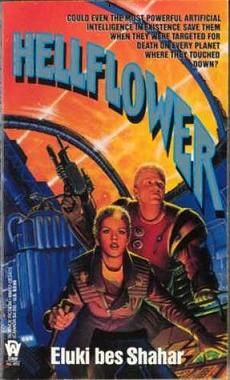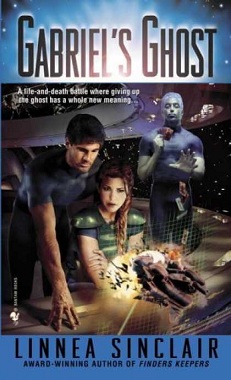
Gabriel’s Ghost
Linnea Sinclair
447 pages
published in 2005
I’d never heard of Linnea Sinclair before I picked Gabriel’s Ghost up in a secondhand bookstore, but the cover and plot looked interesting. Also, I’m still trying to read more female authors. Googling Sinclair made clear she’s a science fiction romance writer and indeed Gabriel’s Ghost won the 2006 Romance Writers of America’s RITA award for Best Paranormal Romance. Neither this nor the title however means there’s anything paranormal about this novel. Rather, it’s a science fiction adventure story with a somewhat greater emphasis on the romance between the two main characters than usual, which does have some consequences for the rest of the plot.
Gabriel’s Ghost starts imperial fleet captain Chasidah Bergren banished to the prison planet Moabar for crime she didn’t commit. Barely arrived, she had to kill a guard who tried to rape her and only then the real danger began, as the next person she met turned out to be somebody from her past, somebody she thought long dead. Gabriel Sullivan is a rogue and a smuggler she had clashed with repeatedly when she was still a frigate captain, until he died a few years ago. Now he’s back and offering her escape, if she helps him with one little job…
It turns out that somebody high in the empire’s hierarchy is once again breeding a long outlawed biological super weapon: the jukor, a murderous animal originally bred to destroy alien telepaths. Sullivan needs Chasidah for her knowledge of how the imperial navy thinks to help him infiltrate the project and destroy the jukors. She’s not the only one on his team; there’s also one of those alien telepaths, Ren, a Stolorth. In the mepire these are the creatures of nightmares, mindstealers, even seen as demons by the Englarian church and yet this same church has raised him from childhood. It helps that he’s blind and hence unable to use his powers; the Stolorth themselves normally kill their blind kind.
Between Chasidah and Gabriel Sullivan there’s a sexual tension from the start. They not only share a past as nominal enemies, but Gabriel also hides a dark secret he needs to get Chasidah to know and trust him about. He clearly sees her as much more than just a tool; she is skeptical and suspicious and needs to learn to trust him, but it’s hard when he doesn’t tell her even half of what she needs to know and worse, might be actively manipulating her. Ren might not be the only telepath on the team…
Basically then Gabriel’s Ghost has two separate plots running. The first is that of the blossoming romance between Chasidah and Gabriel, while the second is a science fiction adventure of escaping prison planets, stealing spaceships and infiltrating imperial space stations to blow up genetic labs. The two are not always integrated successfully, with the latter at times coming to a halt to explore Chasidah and Gabriel’s romance more.
To be honest, the whole jukor threat doesn’t make much sense anyway. They’re basically hard to kill super predators, but they’re still just animals and you can’t help but think a decently equipped modern day army platoon could make mincemeat of them. They’re certainly not convincing as something that could upset the balance of power in the empire. What also doesn’t make sense, for such a secret project is that so many people know or suspect about it. Chasidah’s almost rape actually turns out to have been attempted because the jukor project uses alien Takan women as brood mares for them, with the poor women dying while giving birth. Apparantly the Takan know this is going on and some of them have decided to rape human women as revenge.
The romance also has some problems. Since Gabriel’s Ghost is told purely through Chasidah’s point of view, we never really get to know just why Gabriel Sullivan is and seemingly always was so in love with her. She herself certainly isn’t clear on this. She thinks she’s plain looking at best, not all that interesting or smart and yet at the same time not only has Gabriel after her, there also turns out to be an ex-husband who still loves her even though she divorced him to choose her career over his wish to get children. Not to mention that Ren the Stolorth, who’s described as being a very male sort of alien, also has something of a thing for her, even if only platonic.
There are also some consent issues playing a role here, as Gabriel not only insists that she asks him no questions about who or what he is, but several times manipulates her perception and memory. It’s not out and out mindrape and she does take him to task for it later on, but it’s uncomfortable and she is slightly too forgiving of it to my taste. It all is a bit too reminiscent of certain outdated romance cliches.
There’s also a lack of female characters other than Chasidah. There’s a jealous ex of Gabriel who shows up in one scene, the ship’s cook who gets a couple of lines and a cliche religious fanatic who turns up on the villain’s side. It barely passes the Bechdel test and emphasises how unique Chasidah is to be able to keep up with the boys.
Despite these flaws, which made Gabriel’s Ghost into a lesser novel than it could’ve been, I still enjoyed reading this. Linnea Sinclair is a good enough writer to keep you engaged throughout the story and it’s only afterwards that you start thinking, hang on, that’s a bit dodgy. What for me in the end made the novel was Chasidah who, while sometimes taking a turn to the cliche, still is a smart, interesting character. She’s unsure of herself, but she does take charge when she needs to and keeps a cool head in danger. Ultimately she is the hero of her own story and she is instrumental in stopping the plot to breed jukors. I wouldn’t mind spending more time with her.
